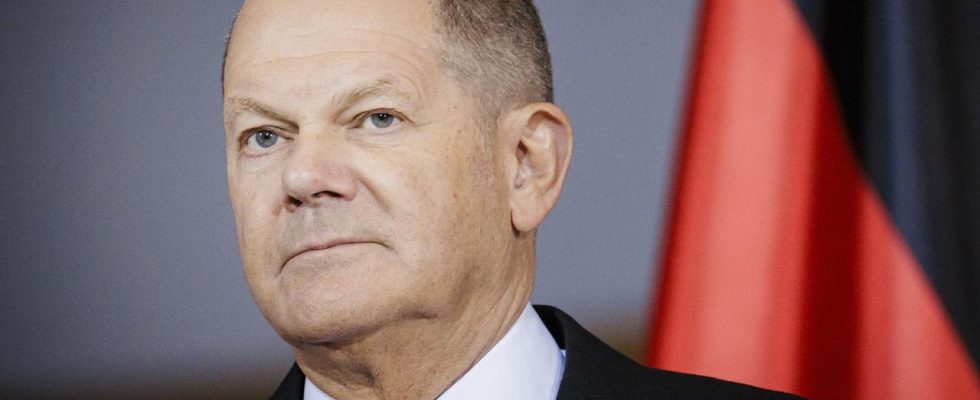The victims of National Socialism are remembered nationwide today. Chancellor Scholz and representatives of associations and churches used the day of remembrance as an opportunity to promote greater determination in the fight against right-wing hatred and incitement.
On the occasion of Holocaust Remembrance Day, Chancellor Olaf Scholz called for a more determined fight against anti-Semitism and racism. In his video message “Chancellor Compact,” the SPD politician recalled the liberation of the Auschwitz concentration camp 79 years ago and the millions of victims of National Socialism.
Democracy results from the responsibility that arises from German history and from the commitment to “Never Again”. “Never again exclusion and disenfranchisement, never again racial ideology and dehumanization, never again dictatorship. Ensuring this is the central task of our state,” said Scholz. That is why the state must combat “all forms of anti-Semitism, terrorist propaganda and misanthropy”.
“Our country is on its feet right now”
But the principle “Never again” is not only aimed at the state, Scholz continued: “‘Never again’ demands everyone’s vigilance. Our democracy is not God-given. It is man-made.” In this context, the Chancellor once again acknowledged the nationwide protest of hundreds of thousands of people against the right in recent weeks. “Our country is currently on its feet. Millions of citizens are taking to the streets – for democracy, for respect and humanity,” Scholz continued in his video message.
Especially in view of the EU-wide influx of right-wing populists “who stir up fear and sow hatred” and in view of reports about “neo-Nazis and their dark networks”, it is all the more important to defend democracy. That’s why people must remain visible and audible – “against anti-Semitism, against racism, against misanthropy and for our democracy,” demanded Scholz.
Auschwitz Committee calls for tougher action
Like Scholz, other politicians and representatives of religious communities and associations have used the day of remembrance as an opportunity to emphasize the importance of the culture of remembrance and to warn against the rise of right-wing extremist forces.
The International Auschwitz Committee called for tougher action against right-wing extremist structures in Germany and Europe. Executive Vice President Christoph Heubner criticized networks of conspiracy liars and agitators for far too long. The associated threat to the rule of law was underestimated. “Misanthropic and anti-Semitic hatred is once again rampant in many European countries,” said Heubner. That’s precisely why the survivors are grateful to the hundreds of thousands of people who fought against oblivion these days.
“Beginnings of National Socialism don’t forget”
Lower Saxony’s Prime Minister Stephan Weil used the upcoming memorial day to warn against an increase in anti-Jewish attitudes. “In Germany and also in Lower Saxony we are unfortunately experiencing a significant increase in anti-Semitism,” said Weil. It is all the more important to keep the memory alive. “We must not forget the beginnings of National Socialism.”
The Federal Government’s Anti-Semitism Commissioner, Felix Klein, also shares this view and explained that “a remembrance without the obligation to act in the here and now and do everything possible to ensure that such injustice never happens again” remains “imperfect.”
“Especially now, when some people want to trivialize or forget this crime against humanity, we have to keep the memory alive. We have to pass on what the last living contemporary witnesses have told us,” explained Federal Interior Minister Nancy Faeser, who took part in the memorial hour in the former women’s museum on Saturday. Ravensbrück concentration camp will take part.
Central Council of Jews emphasizes the importance of memorials
The Central Council of Jews in Germany highlighted the important role of memorial sites and former extermination camps, which made a valuable contribution to preserving the memory of the Holocaust. The sites strengthened “our vibrant democracy,” emphasized President Josef Schuster and called for appropriate support for the institutions.
“This educational work must be adequately funded by the federal and state governments in order to meet the high standards of memorial visits,” said Schuster. With the dwindling number of witnesses to the Holocaust, memorial sites have come even more into focus. “They are essential for living together in an open society.”
Church representative: Social climate poisoned
The chairman of the Catholic German Bishops’ Conference, Georg Bätzing, explained that the memory of the Holocaust is not just a look back, but makes it clear that the dignity and rights of every human being must be respected.
Bätzing said that right-wing populist propaganda had recently contributed significantly to poisoning the social climate: “Some contributions to the debate about migration and integration are characterized by xenophobia, if not racism.” The Limburg bishop explained that it was an encouraging experience for him that hundreds of thousands of people had taken to the streets in the past few weeks to stand up against the social exclusion of people and for the democratic constitutional state.
Remembering the victims of National Socialism
On Saturday, the victims of the Holocaust will be remembered internationally. In Germany, the Tas commemoration of the victims of National Socialism has been a legally enshrined day of remembrance since 1996. It commemorates the liberation of the Auschwitz-Birkenau concentration camp 79 years ago, on January 27, 1945. Numerous wreath-laying ceremonies and commemorative events are planned in the Federal Republic.

